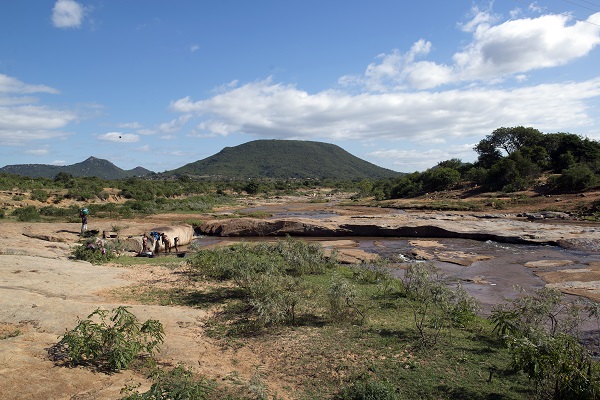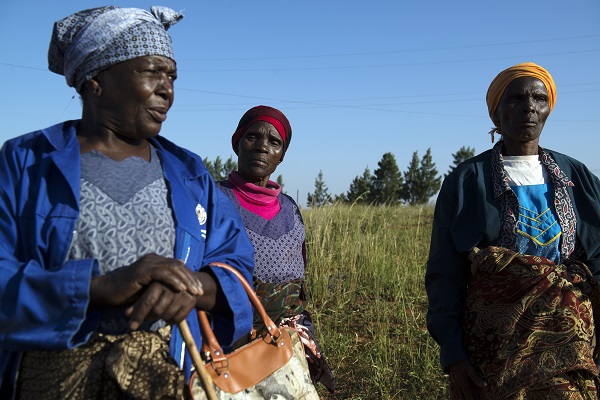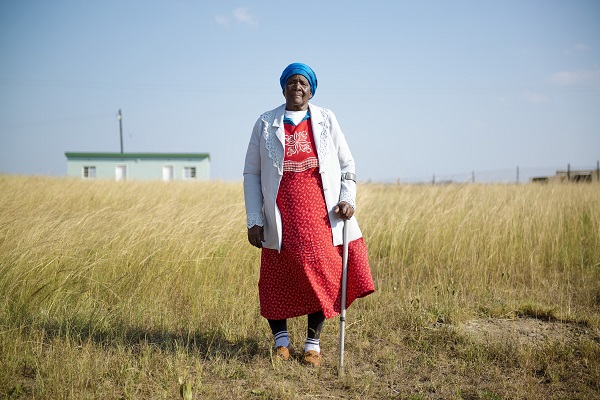Cash transfers in Swaziland
In Swaziland, a small land-locked country in southern Africa, the worst El Niño weather phenomenon in decades has left 25 per cent of the population, or more than 320,000 people in desperate need of food assistance. With entire crops failed, the Red Cross is turning to cash transfers to help see families through the difficult times.

Swaziland. © Emil Helotie / Finnish Red Cross
"I have never seen a year like this. In the past, we have been able to grow some vegetables, but this year, nothing is growing,” says Ntombile Dlamini, 77, shaking her fist at the sky. It has barely rained lately.
People in Swaziland and elsewhere across southern Africa have been waiting for rain for a long time. One of the reasons for the drought is the strengthened El Niño phenomenon, the worst one in decades. Last year, the drought destroyed approximately half of the crops, and this year, almost all of crops were ruined. Approximately 41 million people are currently affected, with that number expected to reach 49 million by the end of the year.
Corn fields are completely dry. Only small streams persist within the river beds.
Normally, Ntombile Dlamini and her neighbours grow spinach, nuts, and various vegetables in their gardens. "For the first time in my life, I had to plant the seeds three times, yet nothing started to grow,” says Msane Magagula, 67.
"There were days when we had nothing to eat, and we could only drink a little water. I was scared I would die and my children and grandchildren would have nothing to eat,” adds her neighbour, Bettena Sihlongonyane, 73.

receive is helping them to cope with the worst drought in years. © Emil Helotie / Finnish Red Cross
The women have come together to receive cash grants from the Baphalali Swaziland Red Cross Society, Finnish Red Cross, and the European Commission's Humanitarian Aid and Civil Protection department (ECHO).
Over the past three months, 4,200 households have received cash transfers, most of them via a text message.
"At first, we didn’t know what mobile money was. When the text message about the cash grant arrived, we would clutch the phone tightly. We were scared we’d drop the phone, and something would happen to the message,” Bettena Sihlongonyane reminisces, as her neighbours laugh. "Now we know what is going on, and we usually go and get the grant the very next day.”
With their personal SIM card, the recipients of the cash grant can claim their grant either from the office of the local phone operator, MTN, or from a Red Cross distribution centre.
According to a survey conducted by the Baphalali Swaziland Red Cross Society, 96 per cent of recipients use the cash grant to buy food.
"We couldn’t plant anything this season”.
The drought is hardest on those who had a difficult time even before the drought. In Swaziland, 26 per cent of the adult population is infected with HIV or AIDS.

and the ten grandchildren she cares for. © Emil Helotie / Finnish Red Cross
Nkhosingphile Mhlanga, 78, is one of the cash grant recipients. All of her children have died of AIDS. She now cares for her ten grandchildren, all of whom are school-aged. "It has been terribly dry this year. We couldn’t plant anything this season,” Nkhosingphile Mhlanga says. "The children have done some household chores for the neighbours to get a little food as a reward. Before the cash grant, we had no other way of getting through this.”
With the grant of approximately 33 Swiss francs, she buys a 15-kilogram bag of mealie-meal, the rough corn flour commonly eaten in Swaziland, as well as beans, potatoes and soap.
"We are very grateful for the grant”.
Basic information
Country
Swaziland
Duration
2016
Partners
Baphalali Swaziland Red Cross Society, Finnish Red Cross

